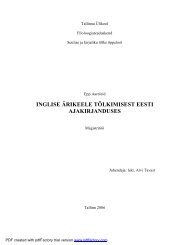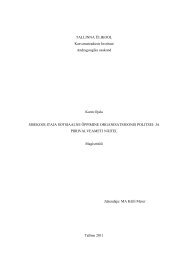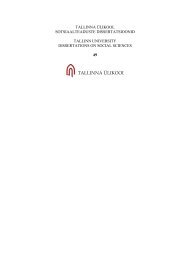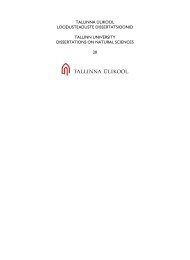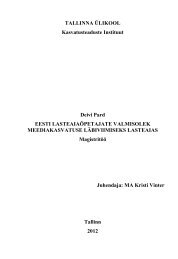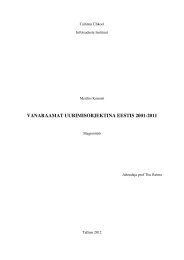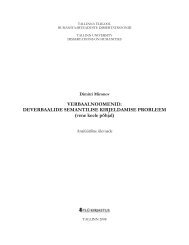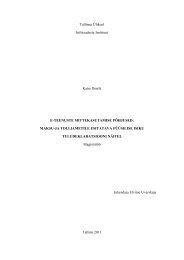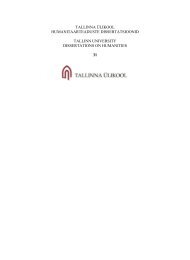You also want an ePaper? Increase the reach of your titles
YUMPU automatically turns print PDFs into web optimized ePapers that Google loves.
imply the absence of neither prosperity nor influential elite. The parents living in Vana-Pärnu,the so-called agrarian town, could afford to sustain their offspring through their universitystudies abroad.A closer look at the government of Uus-Pärnu gives every reason to state that those governingthe town as well as the way they managed it reveal the major characteristics of a small town.First, in case with Uus-Pärnu the great influence of the landlord, i.e of the Order is evident.Great dependence on the landlord is typical of all the small towns in Livonia. The placeswithout the rights of a town depended on the landlord in this respect that the latter had notconferred the rights on them. Although the council of Uus-Pärnu was free to elect its members,the pressure of the Order in the elections is clear. Those favoured by the landlord could make arapid career in the town council and a few years’ membership in the latter could take onealready to the position of the mayor. In Uus-Pärnu, however, we find no trivial careerists for theOrder patronized only those possessing qualities needed to govern a town. Not all the aldermenrelated to the Order became the leaders of the town. Conspicuous is also the great role of anindividual in the town government that could be possible only in a small community. In a bigcity a person could never attain the absolute power in the city government. The influence of thelandlord and the limits of the autonomy of the town is manifest also in the fact that half of thecourt taxes paid by the citizens went to the Order. A considerable part of the political andeconomic elite of Uus-Pärnu was related to the Order and through them the latter couldindirectly direct and influence the town. The issue, however, was not the total absence ofindependence or of self-consciousness from the part of the town community: it resistedresolutely the Commander when the latter asked for equal trade rights in the town. The positiverole of the landlord cannot be ignored in the development of Uus-Pärnu, suffering repeatedlyfrom fires: it was the Order that invested in the town and gave many a time loans or donations.The communal economy of a small town was considerably simpler, less differentiated andless complicated than in a big city. Because of that the administration documents were few,and there were fewer town registers. In the first half of the 16 th century Uus-Pärnu kept itsland register and the town council notebook, the latter containing also accounts with noteson the expenditure, seldom on revenue. The registers and correspondence in Uus-Pärnuwere kept primarily by burgomasters, not by council secretaries as customary in big cities.Modest standards of communal economy and administration, keeping the jobs in the towncouncil less differentiated, was another peculiarity of a small town. The city government ofUus-Pärnu like that in Tallinn or Tartu included mostly merchants. But there wereexceptions, aldermen with the background of an artisan or nobility. The so-to-say moreopen character of the city government was again distinctive of a small town. The developmentof financial and market economy at the end of the Middle Ages and the beginningof the Early Modern Age set new demands to the town government. As administrationasked now for greater bureaucratic expertise, first men with legal education could becomemembers of the Uus-Pärnu town government in the first half of the 16 th century. Clerks thathad worked for the Livonian Order or the Saare-Lääne Bishop constitute a new group ofgo-ahead persons eligible by their education or service for inclusion in the Uus-Pärnu eliteor even the town government that was no longer strictly for those marked by their birth andclass. This testifies to the fact that the new social mobility and diversification of socialstrata characteristic of the Early Modern Age holds good also in Livonia.The population of a small town was less organized and less differentiated. A professionalorganization of Uus-Pärnu was the Company of Merchants (mentioned first in 1474)including local merchants, shopmen from abroad and seamen staying in the town. Thecompany was founded probably at the beginning of the 15 th century. Compared to Tallinn, theelder’s position in the merchants’ guild of Uus-Pärnu was not as high: it was not a prerequisite230



